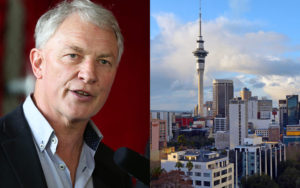Updated: 6:32am – A chance to create a Māori seat on the Auckland Council may be lost today, with the mayor Phil Goff preferring to not to act on the issue.
The city’s Independent Māori Statutory Board and a Māori academic say the time has come for dedicated Māori seats.
The Auckland Council was created in 2010, with the government opting not to include Māori seats. Instead it set up an Independent Māori Statutory Board to advise the council and to sit on committees, but not the highest-level governing body.
“We should be hearing a Māori voice on council,” said Ann Sullivan, associate professor in the Māori Studies department at Auckland University.
“It would be nice to see them make a decision in principle on ensuring they have a Māori voice there. Look at the amount of investment Māori have in the Auckland region.”
Statutory board chair David Taipari has also called for Māori seats, but not to replace the existing board.
“The board has a function to monitor the Auckland Council giving effect to the Treaty of Waitangi. It’s an independent authority, independent from Auckland Council and mana whenua, and Māori at large, so it isn’t a representation model,” he said.
One uncertainty is the position of mayor Phil Goff, who has previously favoured Māori seats, but had also described the issue as not a priority for him.
Over the past four days, the mayor’s office said Mr Goff was too busy to talk to RNZ on the issue.
A spokesperson said Mr Goff will vote for the “do nothing” option today, believing the question is one for central government to resolve.
Māori make up 11 percent of Auckland’s population and currently 57,110 are on Māori electoral rolls – a prerequisite for voting in a council Māori ward.
Law change needed to lift 20-seat cap
Auckland Council doesn’t need government approval to make one of its 20 wards a Māori ward.
But it does need a law change to lift the 20-seat cap, if a Māori seat was to be added.
That’s the question that led the council last term to postpone discussing the issue while awaiting a change to the legislation under which the Auckland Council was created in 2010.
Ms Sullivan didn’t think that should get in the way of a ‘Yes’ vote today.
“I’m sure at some point they will increase the seats, so is that just a smokescreen to say, ‘it’s a bit difficult, so we’re not going to have Māori representation’?” she said.
The desire to raise the 20-seat cap is an issue even for councillors who want Māori seats.
“Now is the time for representation, but we need to go down the legislative route that gives us the ability to say ‘Yes’, but there’s one more seat to be added,” Manukau ward councillor Alf Filipaina said.
Another pro-Māori ward councillor, Efeso Collins, agreed.

“My focus is on broadening the ability to go up to 30 seats like every other local body can, so let’s get the legislative structure right, then we can go back to Aucklanders and say, ‘how do we make this happen?’,” he said.
Because the decision is an electoral one, Aucklanders can contest the outcome either way.
A petition signed by 5 percent of residents – around 51,000 – can demand a poll on the issue, which could cost around $1 million.
The council could avoid that risk by deciding to conduct a poll at the 2019 local body elections, which would cost about $150,000.
-RNZ





























